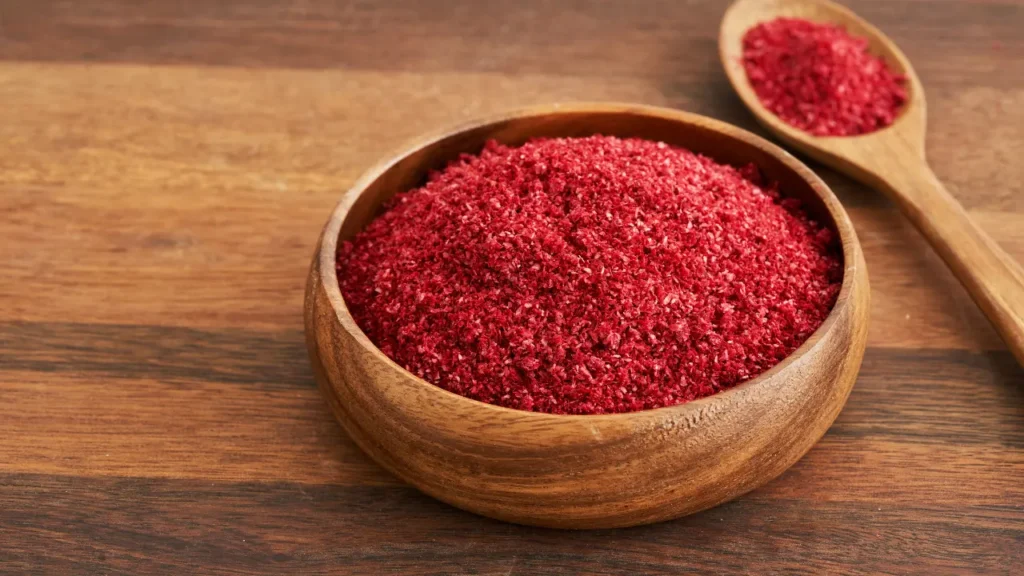Scholars and health enthusiasts are intrigued by sweet sumach because of its possible ability to improve cognitive function. Sweet sumach, a native deciduous shrub of North America, is scientifically known as Rhus aromatica. It has been traditionally used in several indigenous medical systems. With a particular emphasis on how well sweet sumach works to improve alertness, focus, and cognition, this page examines the chemical components of the fruit, as well as its possible health advantages, ideal dosage, adverse effects, and recommendations for responsible consumption.
You May Also Like:
Horbaach Lion’s Mane Mushroom Extract Reviews: A Leading Herbal Nootropic Product
Sweet Sumach: Benefits, Dosage, Side Effects, Drug Interactions, and Other Important Information is an original (NootropicsPlanet) article.
Nature of Sweet Sumach
The deciduous shrub known as sweet sumach (Rhus aromatica) is native to North America. It is distinguished by its fragrant leaves and clusters of yellow blooms, followed by scarlet berries. It usually grows well in poor, rocky soils and can be found in various habitats, from dry hillsides to wet riverbanks. Native American tribes have long utilized sweet sumach for its therapeutic qualities, utilizing its high tannin content in a range of herbal treatments. This plant has great potential in natural medicine, especially as a nootropic, and plays a vital role in its native habitats.
Health Benefits of Sweet Sumach
Sweet sumach (Rhus aromatica) offers a range of health benefits, mainly due to its rich chemical profile that includes tannins, flavonoids, and essential oils. Here, we explore these benefits in more detail, focusing on their potential impact on cognitive health, antioxidant protection, and overall well-being.
Cognitive Enhancement
When it comes to nootropic supplements, sweet sumach’s main draw is its ability to improve cognitive skills. It is well known that the flavonoids included in sweet sumach can help boost brain function, especially in areas like memory, focus, and alertness. Sweet sumach may enhance learning and memory by increasing acetylcholine levels, a neurotransmitter strongly associated with learning. This modulation of neurotransmitter systems may also prevent cognitive decline, which makes it a valuable supplement for people who want to improve their cognitive longevity and mental clarity.
Antioxidant Effects
Sweet sumach contains antioxidants like flavonoids and tannins that are essential in preventing oxidative stress, a significant cause of aging, and many chronic illnesses, including neurological conditions like Parkinson’s and Alzheimer’s. These antioxidants shield cells from harm and preserve the functional integrity of all cells, including neurons, by scavenging free radicals. Reducing oxidative stress promotes general health by guarding against several disorders linked to oxidative stress and helping to avoid age-related cognitive decline.
Anti-inflammatory Properties
Many disorders have chronic inflammation as their primary cause, including some impacting cognitive function. Sweet sumach’s components, especially its flavonoids and essential oils, are anti-inflammatory. These drugs have the potential to improve disorders like arthritis and cardiovascular disease and maybe lessen the symptoms of depression and anxiety. They can also help reduce inflammation throughout the body, including in the brain.
Cardiovascular Health
Sweet sumach contains flavonoids that improve blood vessel function and blood flow and contribute to cardiovascular health. They assist the heart and other essential organs and guarantee the brain a constant supply of oxygen and nutrients. Better endothelial function, a lower risk of heart attack and stroke, and improved circulation are all related.
Urinary and Digestive Health
Sweet sumach has long been used to treat digestive problems and urinary tract infections. Tannins’ astringent qualities aid in tissue tightness and inflammation reduction, which is advantageous when treating diarrhea and urinary difficulties. Its antibacterial qualities, which might lower inflammation and possibly stop bacterial development, support its use in these situations.
Potential Antimicrobial Activity
Preliminary research indicates that sweet sumach may have antibacterial qualities that could aid in the battle against specific bacteria and fungi. However, additional research is required, which may be especially helpful for treating skin disorders, maintaining dental health, and avoiding infections.

Chemistry of Sweet Sumach
Sweet sumach (Rhus aromatica) has a complex and diverse chemical makeup, mainly made of tannins, flavonoids, and essential oils. Tannins are polyphenolic substances well-known for their capacity to precipitate and bind proteins. Potent antioxidants offer a defense against oxidative stress, which can cause harm to cells. Another class of polyphenols called flavonoids is essential because of their antioxidant qualities and functions in cellular signaling networks. Because these substances can pass through the blood-brain barrier, they improve cognitive abilities and neuroprotection.
Sweet sumach’s anti-inflammatory and potentially antibacterial essential oils enhance its therapeutic qualities. These compounds combine to create a complex mosaic that supports sweet sumach’s pharmacological potential, especially when used as a nootropic to protect neuronal health and improve cognitive function.
Physiological Mechanism of Action
Sweet sumach’s physiological effects on the brain are mainly due to its improvement of cerebral blood flow and control of oxidative stress. Sweet sumach contains antioxidants, including tannins and flavonoids, that counteract free radicals and lower oxidative stress, which is linked to neurological illnesses and brain aging. This antioxidative activity contributes to improved brain function and preserves neuronal cell integrity.
Sweet sumach flavonoids are particularly interesting because they can alter brain function. They impact the levels of brain chemicals like acetylcholine, which is necessary for memory and learning, by interacting with important enzymes involved in neurotransmitter metabolism. Additionally, flavonoids may promote synaptic plasticity and neurogenesis, two important aspects of cognitive functions.
These substances also enhance cerebral blood flow, guaranteeing the brain enough oxygen and nourishment for optimum performance. In addition to helping to remove metabolic wastes from brain tissues, this improved blood flow can support the preservation of cognitive abilities and guard against mental tiredness. Thus, the natural components of sweet sumach work together chemically to offer a multifaceted approach to neuroprotection and cognitive enhancement.

Optimal Dosage of Sweet Sumach
The ideal dosage must be determined to maximize sweet sumach’s cognitive benefits and minimize any potential adverse effects. Few scientific studies concentrate on dosage, so additional investigation is required to create uniform recommendations. According to traditional applications and preliminary research, a dosage range of 200–400 mg of sweet sumach extract may be beneficial, while individual responses may differ depending on factors such as age, body weight, and general health.
Side Effects of Sweet Sumach
While sweet sumach is generally considered harmless in moderation, overindulging may cause some adverse consequences. Due to the high tannin content, these could include gastrointestinal issues, including nausea and upset stomach, as well as, in rare instances, kidney inflammation. Sweet sumach should be used cautiously by people with a history of kidney problems or who are sensitive to meals high in tannins.

Potential Substance Interactions with Sweet Sumach
Supplements and other drugs impacting blood flow or neurotransmitter systems may interact with sweet sumach. For example, it may enhance the effects of anticoagulant drugs when taken together, increasing the risk of bleeding. People who use medication should always speak with their doctors before beginning any new supplement, including sweet sumach.
Best Responsible Uses of Sweet Sumach
If you’re interested in using sweet sumach as a nootropic supplement, it’s important to utilize it carefully. To evaluate tolerance, start at a low dose and work your way up to the prescribed amount if no negative effects are noticed. Optimizing advantages while reducing hazards can be achieved by monitoring the body’s reaction and seeking advice from a medical expert.
Sweet Sumach:
Conclusion
Sweet sumach is traditionally valued for its role in supporting digestive health, with its astringent properties believed to help alleviate diarrhea and gastrointestinal discomfort. Furthermore, sweet sumach has been used historically as a remedy for various ailments, including sore throat, colds, and fevers. Its antimicrobial properties suggest it may have the potential to support immune function and combat certain infections, although further research is needed to confirm these effects.
However, caution is advised when using sweet sumach, as some individuals may experience allergic reactions or adverse effects. Additionally, pregnant or breastfeeding individuals should avoid its use due to its potential to stimulate uterine contractions. While sweet sumach shows promise as a natural remedy, more research is needed to fully understand its mechanisms of action and fully confirm its efficacy. As with any herbal remedy, it is advisable to consult with a healthcare professional before using sweet sumach, particularly if you have underlying health conditions or are taking medications.

References:
- Sweet Sumac – Uses, Side Effects, and More. Retrieved from: https://www.webmd.com/vitamins/ai/ingredientmono-359/sweet-sumac
- Sumac: Benefits, Uses, and Forms. Retrieved from: https://www.healthline.com/nutrition/sumac-benefits-uses-and-forms
- Pharmacological and Antioxidant Activities of Rhus coriaria L. (Sumac). Retrieved from: https://www.ncbi.nlm.nih.gov/pmc/articles/PMC7828031/
Important Note: The information contained in this article is for general informational purposes only, and should not be construed as health or medical advice, nor is it intended to diagnose, prevent, treat, or cure any disease or health condition. Before embarking on any diet, fitness regimen, or program of nutritional supplementation, it is advisable to consult your healthcare professional in order to determine its safety and probable efficacy in terms of your individual state of health.
Regarding Nutritional Supplements Or Other Non-Prescription Health Products: If any nutritional supplements or other non-prescription health products are mentioned in the foregoing article, any claims or statements made about them have not been evaluated by the U.S. Food and Drug Administration, and such nutritional supplements or other health products are not intended to diagnose, treat, cure, or prevent any disease.


